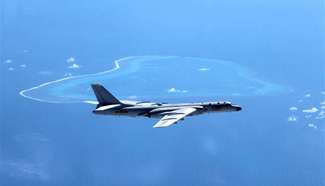By Ma Yujie, Lin Hao
SINGAPORE, July 18 (Xinhua)-- China and the Philippines can set a good example to other Southeast Asian countries in coping with disputes over the South China Sea, if both sides resume bilateral negotiations and aim for pragmatic, positive results, said Dr. Oh Ei Sun, a senior fellow with S. Rajaratnam School of International Studies of Singapore, Nanyang Technological University.
Oh made the remarks in an exclusive interview with Xinhua during the Think Tank Seminar on South China Sea and Regional Cooperation and Development, which is being held here on Monday.
The government of former Philippine President Benigno S. Aquino III filed the arbitration against China in 2013, despite the agreement his country had reached with China on resolving their disputes in the South China Sea through bilateral negotiations.
An ad hoc tribunal handling the South China Sea arbitration issued its final ruling on July 12, sweepingly siding with Manila's cunningly packaged claims, denying China's long-standing historical rights in the South China Sea and claiming China has no sovereign right on some atolls in the region.
In response, China has reaffirmed its unwavering position of non-acceptance and non-recognition of the award, adding that the South China Sea issue should be solved through bilateral negotiations by relevant parties on the basis of historical facts and in accordance with international law, as well as the Declaration on the Conduct of Parties in the South China Sea (DOC).
Unlike its predecessor, the current Philippine President Rodrigo Duterte has expressed his readiness and willingness to hold bilateral talks with China. He has also said that both countries can work together to jointly develop the South China Sea.
Oh said that both countries expressing their willingness to talks shows that they're not too concerned about the arbitration result, but put more focused on returning to the negotiation table. This in itself is of far more significance than the arbitration, added Oh.
"Bilateral relations between China and the Philippines reached a new low point after Aquino III filed the arbitration, if under such circumstances, the two could resume bilateral negotiations and achieve positive, pragmatic agreements, it would definitely set a good example for other Southeast Asian countries in dealing with disputes over the South China Sea,"Oh said.
Oh went on to say that China and the Philippines, as well as other countries in the region, can work together in areas include fisheries cooperation, anti-terrorism information exchange, joint exploration and development of resources in the South China Sea, as well as disaster relief, which are also in line with the interests and needs of ASEAN countries.
"Countries in the region generally hope to see the South China Sea resources developed in order to assist their economic growth, and China can make use of its own funds and technical advantages, and propose win-win, sustainable development strategies to jointly explore these resources."
"This can help build a deeper and wider friendship with neighboring countries, reaching the ultimate goal of mutual benefits,"the doctor maintained.
Organized by the Institute of Chinese Borderland Studies, Chinese Academy of Social Sciences, the seminar attracted more than 20 experts from academic institutes in China and Southeast Asian countries, including Thailand, Cambodia and Malaysia.











